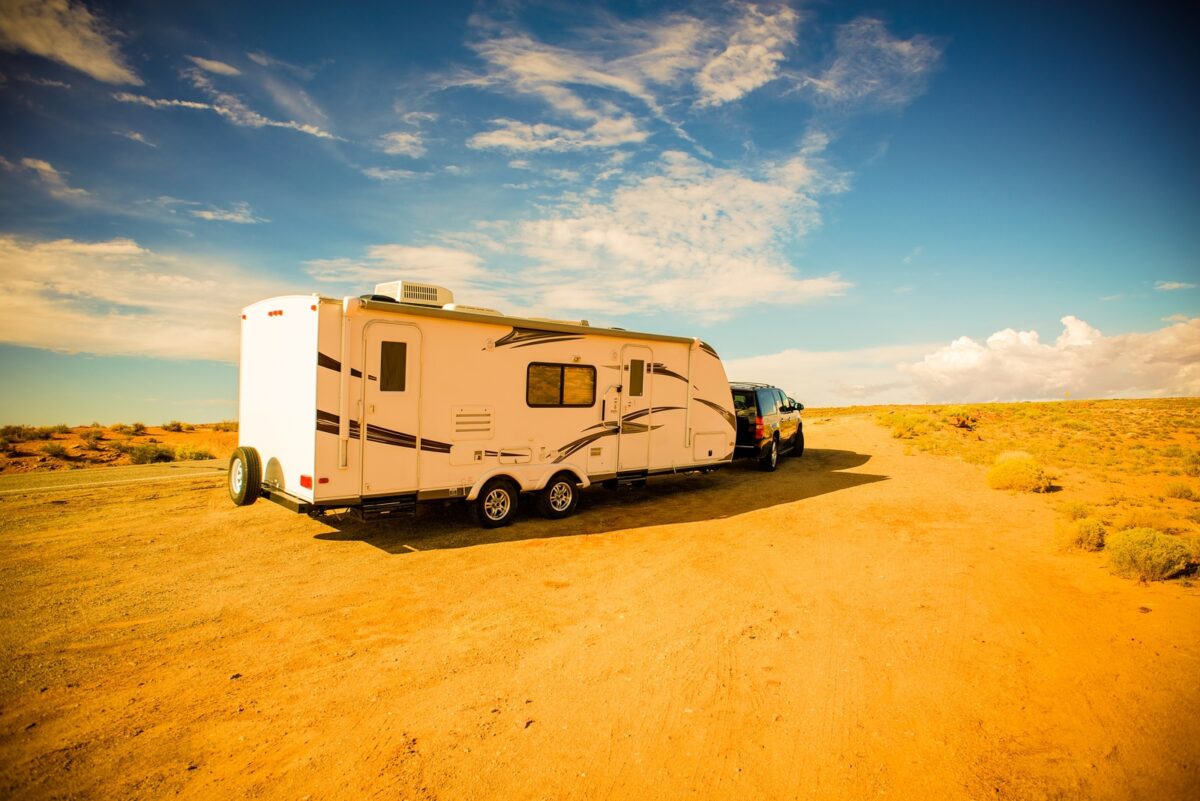Share the post "Do You Need Travel Trailers Inspections in Texas?"
Travel trailers are standard in Texas. People love to use them for long camping trips or traveling around the state or country to see the sights. While they are a fun addition to any household, they have their own rules and regulations you need to follow set out by the state of Texas – which have been newly updated.
The Texas Department of Motor Vehicles has issued a bulletin (#004-23) to provide information on House Bill (HB) 198, which allows owners of travel trailers with a gross vehicle weight (GVW) greater than 7,500 lbs. to self-inspect their vehicles instead of obtaining a state safety inspection.
Effective September 1, 2023, customers must self-certify that they have inspected the travel trailer during the existing annual inspection period and that the vehicle is in “proper and safe condition” and complies with the provisions of the state inspection program.

Self Certification for Travel Trailers
A new form, Application for Self-Certification of Travel Trailer More Than 7,500 lbs. (Form VTR-269), has been created for owners renewing at the county tax office in person or by mail. Owners renewing online will be presented with an electronic checkbox to self-certify. Counties are not required to retain a copy of the completed VTR-269.
The bulletin also provides instructions for county tax assessor-collectors and dealers on how to handle the new self-inspection process and how to verify inspections until the system programming is complete in September 2023.
Step-By-Step Process of a Travel Trailer Inspection in Texas
As of September 1, 2023, travel trailers in Texas with a Gross Vehicle Weight (GVW) of more than 7,500 pounds are no longer required to undergo a state inspection. Instead, owners must self-certify that their vehicle has been inspected and is in safe condition.
Here’s a step-by-step guide on how to self-inspect your travel trailer:
- Gather the necessary materials:
- A copy of your travel trailer’s registration
- A checklist of items to inspect (e.g., tires, brakes, lights, propane system, electrical system, etc.)
- A pen or pencil to take notes
- Inspect the exterior:
- Check the tires for proper inflation, tread wear, and damage.
- Inspect the wheels for any signs of damage or rust.
- Check the brakes for proper operation and wear.
- Inspect the lights for proper function and damage.
- Inspect the propane system for leaks and damage.
- Inspect the electrical system for loose wires, damaged cables, and corrosion.
- Inspect the interior:
- Check for any signs of water damage or leaks.
- Check all windows and doors for proper operation and seals.
- Check all appliances for proper function and leaks.
- Check all gas lines for leaks and damage.
- Check all electrical outlets and fixtures for proper operation and damage.
- Document your inspection:
- Create a checklist of items you inspected and note any findings.
- Sign and date the checklist.
- Keep the checklist with your travel trailer’s registration for future reference.
By following these steps, you can ensure that your travel trailer is safe and meets the self-inspection requirements in Texas.

Trailers Less Than 7,500 Pounds
Owners renewing online will be presented with an electronic checkbox to self-certify. Currently, travel trailers with a GVW of 4,501-7,500 lbs. are already exempt from the inspection requirement as set forth in Chapter 548, Texas Transportation Code, and assessed a $7.50 fee.
Due to HB 198, owners completing a self-inspection of travel trailers more than 7,500 lbs. GVW will be assessed a $7.50 fee. If the travel trailer has a current inspection in the inspection database, the state portion of the inspection fee remains the same.
Counties are not required to retain a copy of the completed VTR-269. Until system programming is complete in September 2023 to include a self-certification inspection type in RTS, please follow the manual verification process for inspection in RTS.
Summary Table Trailer Inspections
Here is a summary of the updated rules for trailer inspections:
| Topic | Details |
|---|---|
| Purpose | To provide information on the registration of certain travel trailers as a result of House Bill (HB) 198 |
| Effective Date | September 1, 2023 |
| Self-Inspection | Owners may self-inspect travel trailers with a gross vehicle weight (GVW) greater than 7,500 lbs. in lieu of obtaining a state safety inspection |
| Self-Certification | Customers must self-certify they have inspected the travel trailer during the existing annual inspection period and the vehicle is in “proper and safe condition” and complies with the provisions of the state inspection program |
| New Form | Application for Self-Certification of Travel Trailer More Than 7,500 lbs. (Form VTR-269) |
| Exemptions | Travel trailers with a GVW of 4,501-7,500 lbs. are already exempt from the inspection requirement and assessed a $7.50 fee |
| Fees | Owners completing a self-inspection of travel trailers more than 7,500 lbs. GVW will be assessed a $7.50 fee |
| Inspection Database | If the travel trailer has a current inspection in the inspection database, the state portion of the inspection fee remains the same |
| County Action | Ensure customers complete and sign the Application for Self-Certification of Travel Trailer More Than 7,500 lbs. (Form VTR-269) or have a current inspection at the time of registration |
| Form VTR-269 | Will be treated the same as a Vehicle Inspection Report for registration purposes |
| Manual Verification | Follow the manual verification process for inspection in RTS until system programming is complete in September 2023 |
| Contact | Contact your local TxDMV Regional Service Center for any questions |

Self Inspection Guide
Most travel trailer owners perform a preliminary inspection to fix issues before dealing with a failed check. Getting a rejection sticker puts more pressure to get any issues fixed quickly.
Brakes
Possibly, the most important part of the inspection is the brake check to make sure they’re in working order.
Tires
Trailer owners often overlook their trailer tires. They assume they’re usually all set, but the tires are the most worn part of a trailer, so it’s an important aspect to have inspected.
Wheel Assembly
Having the wheel assembly checked is crucial if you assemble the trailer yourself. Some trailers can be built or assembled at home, but the wheel assembly may not be perfect, so best to have a professional check it out.
Safety Guards or Flaps
The safety guards or flaps are only part of the safety inspection if there are four tires or more on the rear axle. Otherwise, not every inspector will check these guards as they’re less influential in the safety of the vehicle.
The above parts are the most critical aspects of the inspection, but below is a list of other elements they check during a trailer safety inspection.
- Two Tail Lights
- Two brake lights
- One License Plate Lamp
- Rear Red Reflectors
- Turn Signal Lights
- Clearance Lights
- Side Marker Lights
- Side Reflectors
- Serial or Vehicle Identification Number

Summary with Next Steps
If you need to inspect your travel trailer in Texas, here are some helpful links and contact details:
- Effective September 1, 2023, owners may self-inspect travel trailers with a gross vehicle weight (GVW) greater than 7,500 lbs. in lieu of obtaining a state safety inspection.
- Customers must self-certify they have inspected the travel trailer during the existing annual inspection period and the vehicle is in “proper and safe condition” and complies with the provisions of the state inspection program. 1
- A new form, Application for Self-Certification of Travel Trailer More Than 7,500 lbs. (Form VTR-269), has been created for owners renewing at the county tax office in person or by mail. Owners renewing online will be presented with an electronic checkbox to self-certify.
- Currently, travel trailers with a GVW of 4,501-7,500 lbs. are already exempt from the inspection requirement as outlined in Chapter 548, Texas Transportation Code, and assessed a $7.50 fee.
- Due to HB 198, owners completing a self-inspection of travel trailers more than 7,500 lbs. GVW will be assessed a $7.50 fee.
- If the travel trailer has a current inspection in the inspection database, the state portion of the inspection fee remains the same.
- Counties are not required to retain a copy of the completed VTR-269.
- To renew a travel trailer registration, customers must complete and sign the Application for Self-Certification of Travel Trailer More Than 7,500 lbs. (Form VTR-269) or have a current inspection at the time of registration.
- Until system programming is complete in September 2023 to include a self-certification inspection type in RTS, please follow the manual verification process for inspection in RTS.
- Contact your local TxDMV Regional Service Center for any questions.
Here is a link to the Application for Self-Certification of Travel Trailer More Than 7,500 lbs (Form VTR-269).
Here is a link to the Texas Department of Motor Vehicles website where you can find your local TxDMV Regional Service Center.
Share the post "Do You Need Travel Trailers Inspections in Texas?"
Christian Linden is a seasoned writer and contributor at Texas View, specializing in topics that resonate with the Texan community. With over a decade of experience in journalism, Christian brings a wealth of knowledge in local politics, culture, and lifestyle. He holds a Bachelor's degree in Communications from the University of Texas. When he's not writing, Christian enjoys spending weekends traveling across Texas with his family, exploring everything from bustling cities to serene landscapes.











